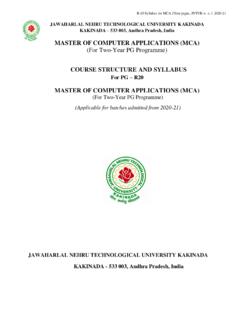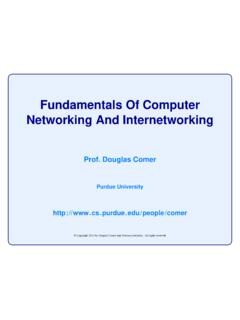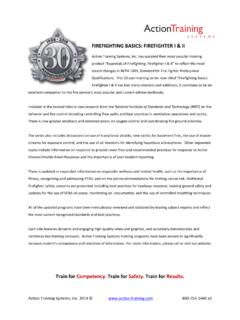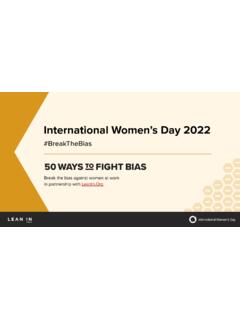Transcription of Circle of Hope - WCSAP
1 A Guide for Conducting Psychoeducational Support GroupsWASHINGTON COALITION OF SEXUAL ASSAULT PROGRAMSHopeCircle ofSecond Edition 2014 HopeCircle ofA Guide for Conducting Psychoeducational Support GroupsSecond Edition 2014 WASHINGTON COALITION OF SEXUAL ASSAULT PROGRAMS ( WCSAP )MissionThe mission of the Washington Coalition of Sexual Assault Programs is to unite agencies engaged in the elimination of sexual violence, through education, advocacy, victim services, and social PhilosophyThe Washington Coalition of Sexual Assault Programs ( WCSAP ) views sexual assault as a means of power, control, and manipulation of others and as a social phenomenon which adversely affects adults and children.
2 WCSAP supports efforts to create an atmosphere of nonviolence through social change. We are committed to empowering survivors and eliminating sexual supports the rights of people to have access to quality information, advocacy, crisis intervention, treatment, education and prevention services. We support the right of a victim to make choices about reporting, prosecution, healthcare, future safety, and other issues raised by the provides information, training and expertise to program and individual members who support victims, family and friends, the general public, and all those whose lives have been affected by sexual values the importance of addressing issues of racism, homophobia, able-bodyism, and other issues of oppression in order to make services accessible to all individuals regardless of race; gender; sexual orientation; religion; age; ethnic background.
3 Social, economic, immigration, marital, physical and/or mental Edition (2014) Revision and Review byWCSAP StaffKelley Amburgey-RichardsonMichelle Dixon-WallLeah HollandJennifer Y. Levy-PeckJeanne Englert McCurleyLogan MicheelExternal Reviewers and ContributorsClaudia AckermanMike LewCorey HodgeAmarinthia TorresProduced byWashington Coalition of Sexual Assault Programs4317 6th Avenue SE, Suite 102 Olympia, WA 98503(360) 754-7583 / (360) 709-0305 copyright WCSAP 2014 (second edition)Design Debi Bodett 2014 Photo Credits: right reserved, including the right of reproduction in whole or in part, any (2006) Version Written byJanet Anderson David LenahanCorey Hodge Dusty OlsonMelissa Kinzer Renee SparksTABLE OF CONTENTSI ntroduction.
4 1 Section 1: Theoretical Framework and Group Guidelines .. 3 Why Facilitate Psychoeducational Support Groups? .. 5 Key Principles of Sexual Assault Support Groups .. 6 What is Unique about Psychoeducational Support Groups? .. 11 Group Dynamics and Stages of Group Development .. 16 Goals and Foundations of Effective Group Facilitation .. 18 Personal Characteristics of Effective Group Facilitators .. 20 What an Effective Group Facilitator Does .. 28 Facilitator Training and Supervision .. 34 Section 2: The How To s of Running a Group .. 39 Planning a Psychoeducational Support Group.
5 41 What is the Need for the Group? .. 42 What Target Population Will You Serve? .. 43 Where Will You Hold the Group? .. 48 Length, Frequency, and Size of Group .. 49 Ground Rules .. 50 Having One or Two Facilitators .. 51 Marketing and Recruiting Strategies .. 53 Measuring Outcomes .. 55 Prescreening .. 60 Development of a Curriculum .. 67 Practical Application .. 71 Practical Considerations for Group Functioning .. 77 Problems, Pitfalls, and Possible Responses .. 79 Section 3: Appendix .. 85 Reading Guide for Support Group Facilitators.
6 87 References .. 90 Sample Tools .. 931 Washington Coalition of Sexual Assault Program | particularly successful method for working with survivors of sexual assault and trauma is to bring survivors together in groups. Groups are an effective tool in giving hope and providing support, validation, connection, healing, and empathy. At the core of all sexual assault trauma is disempowerment and disconnection. To assist in recovery, empowerment and connection are key factors. It is amazing to witness the transformation that many survivors make because of these groups because they realize they aren t alone, because they realize that people care, because they learn that it wasn t their fault, and because of the hope that comes through connection and validation.
7 The relationships that members develop may be some of the most positive and supportive in their lives. Because these groups can have such a profound impact on survivors of sexual assault, it is vital that as advocates we possess the skills and knowledge to effectively facilitate groups. Hence, the purpose of this manual: to provide a roadmap of sorts, to navigate through the world of psychoeducational support groups. This manual is considered a basic guide, written with beginner facilitators in mind. It offers practical guidance and recommendations for facilitation and design of psychoeducational support groups. The sources include existing research and literature about groups, the Office of Crime Victims Advocacy (OCVA) support group standards, and the experiences of those who participated in writing this manual.
8 We encourage experienced group facilitators to add their own wisdom and experience to the information presented here as they conduct support groups. 2014 Circle of Hope | A Guide for Conducting Psychoeducational Support Groups2 This new edition presents a model for psychoeducational support groups that is consistent with key principles of advocacy: empowerment-based advocacy, trauma-informed services, working within an anti-oppression framework, and promoting survivor-centered services. The group model is strengths-based and focused on manual is divided into three sections. The first section describes the theoretical framework and guidelines specific to psychoeducational support groups, including definitions and characteristics of these groups, as well as some effective facilitator fundamentals .
9 The second section describes how to set up groups, curriculum development suggestions, common pitfalls and solutions, and other recommendations. The Appendix includes resources, references, and samples of helpful tools to use. As you work to provide the most effective services to survivors, we hope that you find this information useful and FRAMEWORK AND GROUP GUIDELINESSECTION 1 THEORETICAL FRAMEWORK AND GROUP GUIDELINES 3 Washington Coalition of Sexual Assault Program | Circle of Hope | A Guide for Conducting Psychoeducational Support Groups4 THEORETICAL FRAMEWORK AND GROUP GUIDELINES THEORETICAL FRAMEWORK AND GROUP GUIDELINES 5 Washington Coalition of Sexual Assault Program | FACILITATE PSYCHOEDUCATIONAL SUPPORT GROUPS?
10 Psychoeducational support groups have the following benefits: They provide safety, empathy, validation, and much-needed support. They provide factual information and enable participants to learn new coping strategies. They decrease isolation and a sense of alienation. They allow members to meet others who are dealing with similar experiences. They help members develop a sense of community. They help participants to identify the nature and impact of negative societal attitudes and misconceptions surrounding sexual assault. They clarify the message that sexual assault is never the fault of the survivor. They can restore a member s spirit of hope and self-confidence.









